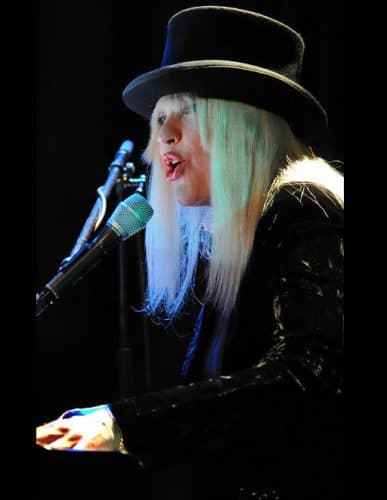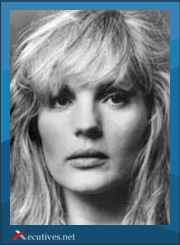Chi Coltrane started her music career as a pianist, singer and songwriter in Chicago, where she soon became famous. Her single, “Thunder and Lightning” sold more than one million copies, and rocketed to the top of the charts as a certified major hit. With her amazing voice she heralded as a rock legend since the early Seventies (“The First Lady of Rock” and the “Queen of Rock”) after Janis Joplin, and she headlined on stage with artists and bands such as The Who, The Eagles, Stevie Wonder, and Rod Stewart. Here you can read a fascinating second Xecutives.net-interview (first interview in 2009) with a rock legend who has always gone her own way; a lady who has never been consumed by fame. After several concerts in Europe, also in Germany and Switzerland, Christian Dueblin again had the chance to talk with her about her music career, her debuts in Europe and her music visions. Ms. Coltrane talks openly about her first time in Europe back in the 70’s, her sudden disappearance for almost 15 years and her comeback. She discusses her musical approach, what makes a good song, comments on music legends such as Jon Lord, Paul Buckmaster, Adele, Amy Winehouse and Queen’s guitarist Brian May, and she gives us a very interesting glimpse behind the music biz scene and its changes in the last decades.
Dueblin: Chi, you are actually working on your comeback and recently you had great concerts in Europe. When was the first time you were in Europe?
Chi Coltrane: It was probably in 1972 or 1973 because of my hit “Thunder and Lightning”. This song was a hit in America first, then in Germany and Switzerland, all over Europe and then all over the world. My first show that I did was in Germany in Munich. It was a TV show called “Musikladen”, and was hosted by Michael Leckebusch (they later put out a couple of albums of the show). I was on there, as well as Stevie Wonder. I went on and did 3 songs on the show. Then I was going to go back to Los Angeles after that, but CBS got flooded with phone calls from TV studios and other shows, all over Europe, saying they wanted “that blonde, that Wildkatze, with her hair flying” on their shows. CBS said: “Oh that’s Chi Coltrane, she’s here from America.” My manager and I had come over just for that one show, and had planned to go back; but we ended up staying for 2 months because we had so many interviews and television shows all over Germany, Switzerland, Austria, Holland, England: it just exploded. Then my manager went home and I stayed for about another month, doing interviews and photo sessions.
Then I did my next album and had more hits and a lot of things were happening. Through the 70’s and through the 80’s, I was touring and doing concerts and television shows like crazy. Unlike today, they had a lot of music shows on TV back then.
Dueblin: Can you describe some of the changes in the music business since you came out in the 70’s?
Chi Coltrane: Oh, the music business has changed radically. It’s amazing how much it’s changed. When I came to CBS in the 70’s, record companies were signing up artists that they believed in. In those days, you had to really write good music – you couldn’t just get signed if you did junk. So the music in those days was really good. In the 70’s and 80s we had good music, good musicians and good song writers. And the record companies would sign you up and they would promote you. They would make sure you got TV shows. They’d make sure you got interviews and they would make sure your record got played on the radios. They’d take it around to the radio stations; and the radio stations, if they liked your music, would play it. The recording companies don’t do much of any of that now.
Dueblin: Jon Lord described changes in music business as you do and said in his interview with me that they gave artists a real chance in those days with a lot of freedom regarding one’s music and music visions.
Chi Coltrane: I am very sad about Jon Lord’s death. He, Peter Frampton and I headlined at the Roth Blues Festival in Germany in 2011. Jon was right; a lot of these things have changed since he was recording with Deep Purple. Now it’s a different thing. Today, if the artist wants to have real promotion, they have to hire a promo person, themself. In the past, the record companies, if they wanted to promote someone, would have to pay a promo person. Now an artist has to do pretty much everything themselves.
Also, it used to be that you always had a manager, but now there’s not much a manager can do for you. Especially if you are a known artist, you already have a name and can get a recording deal just like that, if you are famous. Managers used to have to coordinate all kinds of things for you. Now, if you have a promotion person, they hand you the list of where you’re going to go, when they’re going to pick you up, what you’re going to do, you know. It’s like Jon Lord said in your interview. It used to be that the record companies took care of that and they’d hook you up with a promoter and support you in any aspect of your career life.
Dueblin: Was there a difference between your audiences in America and in Europe?
Chi Coltrane: I’m sure there are some differences but not in the ways that count, no. People are really beautiful when they are listening to your music and they are really enjoying it. They care enough about your music to buy a ticket and come to your concert. It’s really beautiful. You see the beauty in people, you really do – at least I do. And I especially like it when they are singing my songs with me – the whole audience is singing the choruses with me. I love it! It’s really great and this is like a family thing then, not just ”me” up on the stage. It’s like you’re in the living room with each one of them, individually. I have a listening audience and it’s great. Besides, I like this thing they do specially in Europe where they light these little candles, or something. They used to use lighters, now they use their cell phones (laughs).
Dueblin: Whenever I talk about you with some of my interview partners, of course they know you. You were here in the 70’s and 80’s and had hits all over the world. You also did some work with Tangerine Dream in 91 (the music for “Tatort”) and a project for CBS with other big names for the saving the rainforest. But then, all of a sudden, you just disappeared. What happened?
Chi Coltrane: Well, what happened was in the 90’s. I started to become ill. I had burnout. I took on a new manager in the late 80’s – 1990 and he was very greedy, he just wanted money. He signed me up at a time when I had already been doing a lot of concerts. I think that year I did about 300 concerts – and there are only 365 days in a year. So I was just ready for burn out. I knew I needed to have time off. I mean some real time off, like 3 months or something.
I just had to go to Israel for a couple of weeks to meet with the president of CBS in Israel. A friend went with me and we were driving from Jerusalem to Tel Aviv. I met with him and this and that, I spent a little extra time there then went to Switzerland and I was planning on going home. And this new manager handed me a tour! And I said: “I told you I can’t do another tour. I told you I’m worn out from everything.” He said: “No, no, no, you’ve got to do this tour, I got this booked now and you just had 2 weeks off in Israel.”
Dueblin: He obviously did not care about your health. He only wanted to make money with you?
Chi Coltrane: Yeah, he just wanted the money. He knew that I was very famous and he knew that anybody who booked me was going to make money and it would be easy to book me. And he wanted right away to make all kinds of money because he had just signed me up. And he didn’t care about how I felt or what I had just been through – you know, a whole year of touring. We had a verbal contract, we didn’t have a signed contract, but my word is more important to me than any piece of paper. If I say that I’m going to do something, then I do it. Now I had told him: “I’m not going to tour now because I don’t feel good.” So I could have backed out of it. But that wouldn’t have been fair to the promoters and it wouldn’t have been fair to my fans, so I did the tour: but then informed him that he was no longer my manager. He had only been my manager for something like 2 or 3 months.
Dueblin: What happened after that tour?
Chi Coltrane: Well, I went home and I had burnout. I was really tired. No, actually it went way beyond that. I’d get up at 9:00 and by 11:00 I was ready to go to sleep again. I couldn’t drive a car. It was dangerous for me to drive because I’d fall asleep. When I stopped at a red light, I was already in a deep sleep before it turned green. It just got worse and worse and I couldn’t do anything.
Dueblin: So, there was no way you could perform?
Chi Coltrane: Definitely not! The condition that I suffered from is called “adrenal fatigue”. The adrenal glands are where adrenaline comes from. If you have too much, you’re too nervous and if you have too little, you sleep and you are tired all the time. With adrenal fatigue you don’t really live; you don’t really burn any energy; you just sleep. The doctors that I went to were no help. Then I heard that Cher had had a similar problem. I didn’t know how to get in touch with Cher and I was tired – too tired to even try to get in touch with her and to ask her who she went to and who did what.
So one day I decided to go see my old hairdresser who I had gone to before. So I went to see him and he said his wife had had a problem like this and a doctor helped her. He asked me: “Would you like to know the name of the doctor that helped my wife?” And I said: “Yes, I would”. So I went to that doctor – bottom line – she helped me. She right away knew what it was and she said: “You just need this supplement, you take it for about a year and then you can stop because your own will kick back in.” So I went to her, she gave me the right supplement and I took it for about a year. Then I didn’t need it anymore. I felt like my old self again, the way I used to be, I mean – my young self again. But 15 or 16 years had gone by. When I realized that I asked myself, where did all these years go? It was like I had slept them all away.

Chi Coltrane; by courtesy of Chi Coltrane
Dueblin: In 2009 you started your comeback and you seem to be full of energy and in great shape. Where did you do your first comeback concert?
Chi Coltrane: I received an email from a promoter I used to work with in Austria. He contacted me and wanted to know if I would like to do a concert in Austria. And I said: “Yes I would like to do it.” I took 3 musicians with me: guitar, bass and drums and I played the piano and sang. We had a nice band – nice rock. Their representative said to me: “Although we had about 28’000-30’000 people the night before and other nights, on the night that you perform because you’re the biggest international star we’ve ever booked, we expect between 40 and 50’000.”
Dueblin: But there were a lot more people attending your concert!
Chi Coltrane: Yes, this was great. On the night that I performed, 100’000 people came. It blew them all away! They could hardly believe it; they were shocked! A TV production crew was there, because they were going to show it live. And they said: “Wow, there are a hundred thousand people here! How does that affect you? What do you think? How do you feel? I said: “Well, it’s great.” And they said: “But doesn’t it make you nervous?” and I said: “No, it’s the same as having one. Because I go into another world when I perform, it’s not about how many people are there. I do the same performance whether there is one or a hundred thousand or a million.” And they said “Oh wow.” I think they were more nervous than I was (laughs)! So I just went out on the stage; I don’t think I ever get nervous about going on stage. They showed it live on TV and they recorded it because they wanted to show it 2 or 3 more times on TV I guess, from what they told me. Then I got all the rights to the recording, so I am releasing it now. We also have a CD of it. So it’s coming out as a CD and DVD.
Dueblin: What happened after that first concert in Austria?
Chi Coltrane: After that, I did a tour in Holland – a very successful tour in the fall of 2009. Then I did touring in 2010 and 2011 as well. Last year I did some concerts in Germany. I did an important show on ZDF and about 7 weeks ago I did a talk show in German on NDR.
Dueblin: You just spoke about a burnout that depleted you for nearly 15 years and yet you come back transformed: you look even younger than before!
Chi Coltrane: (Laughs) I told them in Germany that I had a “Dornröschenschlaf”. We call it Sleeping Beauty sleep in English. I was at the hair salon in Los Angeles, and while the stylist was doing my hair, the ex-manager for a famous artist (I think it was one of Donna Summer’s managers from the past) was waiting to have her hair done next; and she was looking at me for a while… then all of a sudden she asked me “Are you Chi Coltrane’s daughter?”, to which I replied “No, I’m not.” Then she said something like “Well, you could be – you look just like her!” I didn’t say anything; and after a long pause, the hair stylist exclaimed “This IS Chi Coltrane!!!” Needless to say, she was very surprised (laughs). My promotion lady is constantly being asked: “How can she look so young after all this time?” She just answers that I slept for 18 years!
Dueblin: You are certainly not sleeping anymore! Whoever sees your concerts live or on YouTube or TV, will see and feel a tremendous power coming through your music. It makes the hair on my neck stand on end when I hear it. Does your music give you power?
Chi Coltrane: The music doesn’t give me power. The power flows through me into the music. It’s spiritual and it’s powerful…I don’t think it could get more powerful. It’s already breaking strings on the piano. Even in the video they talk about the glass of water on the piano jumping all over the place and all I’m doing is playing with ten fingers. I’m not hitting it or kicking it; it’s just the energy and the people who are listening say they are shaking and have goose-bumps and it’s amazing. In the studio, I heard the piano tuner complaining, saying “it must be that Coltrane playing this piano – she breaks these thick bottom end strings on the piano”. I only play these strings with my little finger.
Dueblin: I am certain that a lot of your older fans are excited about your comeback.
Chi Coltrane: Yes, and that makes me feel good. I’m happy to see them again; but I also noticed in some of the audiences in Germany: I remember one night, I think at least half of the audience were young people, probably in their 20s, and some teens as well. I know that I get the older people, too, who were around when I had my hits in the 70’s and 80’s but it’s really great when I see the young people, even the teenagers and 20 year olds, and they’re getting into the music. They buy my CDs and downloads, and are coming to my concerts as well. I asked some of them: “How did you know about my music?” And some of them said they found out on the internet and others said they knew it from their parents and others said that they walked into a record store and looked at some old albums and they thought mine looked interesting and they’d give it a try. They say they were surprised at how good the music was, and became fans.
Dueblin: How do you feel compared with back then? Is there a difference between your attitude now as opposed to thirty years ago?
Chi Coltrane: Maybe not my attitude, but certainly I’ve acquired more wisdom. I think maybe I’m a deeper, maybe a better person now, than I was then – I hope so. I’ve had more time to think about who I am and what I’m doing. Music is such a big part of me. I think that it’s a gift to be able to be a musician and have people who can appreciate your music and are willing to come to see you in concert and buy your music. I have a humble attitude about that. I think that the people should be appreciated for everything that they do for you too. I don’t think like a star. I don’t think I ever really did. I relate to the people as being one of them.
Dueblin: Two or three years ago, during our last interview we spoke about Amy Winehouse and other musicians. You prophesised, that she would die and she did. How did you know something like this would happen?
Chi Coltrane: Well, they make a wrong choice at some point in their lives. And they go on a road where there is no turning back. The important thing to do is to have the wisdom not to go down that road… not to take that road. And for some reason, a lot of them die at the age of 26: A LOT of them. Kurt Cobain, Amy Winehouse, Janis Joplin and so many others.
Dueblin: It seems to me that people like Amy Winehouse, such talented people, get overtaken by other people and things like fame and money. They are so young, how can they be prepared for such overwhelming circumstances?
Chi Coltrane: Actually parents are supposed to be preparing their children to be able to think straight. In today’s society a lot of the parents are not really being parents to their children. You can’t only think about being a friend to your child. You have to parent your child, you are supposed to instruct them and teach them the right way and guide them so they don’t make mistakes. We need to show some common sense and really love our kids. Unfortunately a lot of people, especially in the music business and theatre, are just thinking of their own careers instead of their kids and their kids just try to find their own way. And they end up making wrong choices, taking the wrong road and are surrounded by people who are only interested in money.
Dueblin: You have never taken drugs and you do not drink alcohol, which is quite special in a world that also got fame because of excesses. What would you tell young people about taking drugs?
Chi Coltrane: Don’t do it! It’s not worth it! And just know that even if the other kids laugh and say things like: “Oh you’re weird because you won’t do it.” Just know that you’re the one that’s strong, not them. You’re the one that’s right, not them. And you’re going to be wise and amount to something, they won’t. If you make a choice to do drugs one time, it can mess you up for the rest of your life! I have seen this so many times regarding famous musicians who died because of drugs. It shouldn’t be a choice. So many artists were successful in the beginning and then they started on drugs and they went downhill all the way…and drugs don’t stop usually till they kill somebody. Alcohol can do the same thing.
Dueblin: Tell me a little bit about your relationship to Grammy Award winner, composer and arranger Paul Buckmaster. He mentioned you and he was also very fascinated by your music.
Chi Coltrane: Yes. I met Paul when I was about to record my first album for CBS. Paul was already famous. He had done those first arrangements for Elton John; and I believe Paul was in a great way responsible for Elton’s initial success. Well, I asked for a meeting with Paul, and I met with him at the producer’s house. He listened to my product and, as you said, he was impressed with the music. We belong together, you know, musically I mean. He has classical roots, as I also do, and he has jazz roots too, as I do. We work well together and he has a great professional attitude. I have a great respect for him.
Dueblin: Paul doesn’t only appreciate and like your music, he also did strings arrangements for you.
Chi Coltrane: Yes, his style of arrangements for other musicians and pianists, like Elton John, were perfect for me; so he did all the string arrangements on my first album and also on my second album. Now I’m getting ready to go into the studio again, and it may well be that we will again be working together… I’ll see how everything is going with the new songs. I have some really great songs – I say that humbly; but they are really great. Other people have heard them and they’re knocked out by the songs, Paul included. I have these songs that I plan to put on the next album. I’m just going to fill it with great, great songs with a very contemporary production. So that it will sound very today but with great songs that you don’t usually hear today.
Dueblin: You did a great career in the past, composed lots of wonderful songs and now, you are in the middle of your comeback. What would you say are the major differences between today’s songs compared to the songs written and performed in the 70’s and 80’s?
Chi Coltrane: Well I told you about a lot of things that have changed in the music business, but the music itself has changed too. I notice that a lot of young people are saying to me that they like the music from the 70’s and the 80’s because the songs were so much better than today. Today, it’s like, there’s one line of music in a song that just keeps repeating and repeating and repeating the same line. I’ve noticed this consistently with so many songs – almost all of them do that. It’s not a real song – just one line; and they wear it out! By the time the song is finished, you’re glad it’s over, you know?
But musicians used to create real songs that would move you with real lyrics that really meant something. That is what Jon Lord also mentions in your interview. And he is right. I think one of the reasons that Adele has so much success right now in England is because the lyrics that she sings really mean something.
Dueblin: You met some very famous musicians in your life. You also met Brian May of Queen. What are your back stage memories?
Chi Coltrane: There’s a genuine respect for each other. Like when I went backstage to a Queen concert. I had never met any of the guys from Queen and the security told them: “Chi Coltrane wants to come back here and wants to talk to Brian May” because I was interested in asking Brian May, “Queen’s” guitarist, if he’d be interested in maybe working with me on my next album at that time. So he came out and said: “Chi what are you doing here in Paris?” and I said: “Well I wanted to come to say “hi” and to ask you if you’d be interested in working with me on my next album.” And he said: “Yeah, sure.” So we went backstage and talked about it.
I think there is a mutual respect among musicians who worked to get to where they are. And it’s a small world. Because they all know about each other. They know more about you than you think. When I worked on stage, I headlined with the Who and with the Eagles, Rod Stewart, Randy Newman and Stevie Wonder, so many different artists.
Dueblin: Would you like to tell us something about Rod Steward, this living Rock legend?
Chi Coltrane: Yes, Rod Stewart is a really cool artist. I was doing a concert, Rod Stewart was headlining too. I was the only woman headlining on this festival. And they had a problem with the sound and there was this loud whistle of feedback in the sound system; and they said: “Well you’ll just have to go on like that because there’s no time left.” My manager said: “No way, you have got to be kidding.” They didn’t fix it and the guy was running out of time and it was the first time that he had produced this big festival. All of a sudden Rod Stewart stepped up and said: “I will let Chi use all of my sound equipment and my sound man.” and he did! And he saved the day for me. I would have had to cancel and a lot of people would have been disappointed, that was in the mid or late 70’s and I had a lot of hits at that time.
Anyway, it’s like there’s an unspoken language between you and other musicians. It’s so cool how you can relate to each other, because there are a lot of things that are typical of musicians. We also have the same twisted sense of humour, for example.
Dueblin: Do you listen to a lot of other music?
Chi Coltrane: Not really. I like Coldplay, I like U2 and Dream Theatre. I do listen occasionally, to the radio, and if I don’t like what’s playing, I’ll change the station. I don’t let myself listen to stuff that’s inferior. It’s a waste of time and I don’t think it’s healthy…
Dueblin: … sort of like walking out of a bad movie – you just don’t want to waste the time if it’s not something you like.
Chi Coltrane: Exactly! That’s a good comparison. It’s a waste of time if you spend 2 hours watching a movie that is not even that good…If it’s not even well done, or it’s not even a great story.
Dueblin: What does in your opinion make a song great?
Chi Coltrane: In my opinion, a great song is a great composition – really something good musically and lyrically. Then it should be produced right and arranged right. Then you can really get into it. But you don’t want to feed your mind on something that’s inferior, because you don’t want to start thinking like that. You want to watch or listen to something that is really good quality, that is interesting; that’s not going to be damaging to you psychologically or in any other way…something that’s going to be meaningful, because it will influence you: how you feel, whether you feel up or down, whether you feel weak or depressed; or encouraged and strengthened. I think we have to be careful what we feed our minds: that goes for movies, and music and books too. You’ve heard those sayings “You are what you eat”; and “As a man thinks, so is he”. It’s like your body, if you feed your body right it’ll be healthy and if you feed your mind right, it’ll be healthy. And if you don’t, you’re affecting yourself in a negative way.
Dueblin: Chi, you composed all of your songs yourself and you have also written all the lyrics. You spoke before about the spiritual aspects of your music. Can you elaborate on that?
Chi Coltrane: Music is very spiritual – it‘s known to be spiritual; it always was. It’s not a physical thing…well if you talk about the actual playing of the instrument, of course, that’s physical. But the inspiration of it; writing the song, the feelings you get when you hear it – all of that is spiritual.
Music can do things to people’s spirits. There are people who listen to some music and are physically healed by it, while they are listening. That’s what music should do: it should heal people; it should encourage you; it should strengthen you. It should make you feel good. If you’re going through something difficult, you should be able to put on some music that you know is going to help you to feel better. It is the same with the lyrics. If you listen to music with lyrics that describe something that you’ve been through and how they came through it, it can really encourage you and help you.
Dueblin: You’ve spent so much of your career playing in Europe – did you ever experience any cultural problems or misunderstandings here?
Chi Coltrane: Not really problems, but there were a few funny incidents. You know, my mother was German and my father came out of Germany. They used to speak some German together, but I don’t remember much of it because they divorced when I was about 5 years old. But there was one word that I learned from my mother; every now and then when she would come into my room and see the clothes scattered around, and she would say something like “You clean up your room, it looks like the room of a Schweinehund!” When I asked her what “Schweinehund” meant, she said that “Schwein” means pig and “Hund” means dog, so I thought it just meant I was messy – like a pig or a dog would be. Other than this, she didn’t really teach us much German. Then, years later in 1972, I had this world hit “Thunder & Lightning”, and I came to Germany where I had a meeting with Rudi Wolpert, the president of the CBS recording company, and Fritz Rau, who was a big concert promoter back then. We met and sat at a table in a restaurant and I said: “Well, here we are – three Schweinehunds!” And they looked at me in shock and I thought: “Uh oh, did I say something wrong?” (Laughs) Then all of a sudden, they started laughing and I’m so glad they did, because I didn’t find out until later, that Schweinehund doesn’t mean “pig-dog”, it means something more like S.O.B. or worse!!
Although we had never met before; fortunately, they thought it was funny. And later, when I was on the train leaving, Rudi Wolpert was running next to the train just outside of the window, holding a sign that said: “Auf Wiedersehen, Schweinehund!” as I was waving goodbye, and people could see it! Can you imagine what they must have been thinking? (laughs)
Dueblin: So that’s the typical music business humour that you were talking about!
Chi Coltrane: Yeah, you’d never get away with that anywhere else (laughs).
Dueblin: As you said, “Schweinehund” is a BIG insult in German – it’s REALLY bad.
Chi Coltrane: You see, I had no idea. What a way to introduce yourself to the heads of your German music business, huh? But let me tell you another story just to explain, how other people think and act: I was in Germany in 1986 after Chernobyl. And my friend and I had a Geiger-counter with us. And it was a good thing because when we went into our hotel in Germany, the Geiger-counter was going off like crazy. We had to dust all the furniture and after we cleaned, it didn’t register any more radio activity. So we were glad we had it with us and we took it to a restaurant because we weren’t sure if the food was going to be safe either, you know? The owners of the restaurant saw us trying to measure the radioactivity and they kicked us out – all of us and the Geiger-counter with us!! We had to leave.
Dueblin: So you did not appear in the guest book?!
Chi Coltrane: (Laughs) No, definitely not! The same friend and I also got kicked out of a vegetarian restaurant on another occasion in Switzerland. On the way to this restaurant, we saw one of those stands where they roast chicken on a spit. So we bought one and we took it with us in its bag, to the vegetarian restaurant which we coincidentally saw on our way home. We ordered our vegetarian meals and when it was served, we took the chicken out of the bag. I think I probably pulled off a leg and handed it to my friend, and took the other leg for myself; and we started eating this chicken with our nice vegetarian dinner. Then the waitress came up and she was REALLY upset. She said we had to leave. And I said: “But we haven’t even eaten our dinner, if we have to leave, then we’re not going to pay for the dinner. So she stood there looking at us, and thinking; and although she was not happy with us, she said we could finish our meals, but that we could never do something like this again!
It never occurred to us that vegetarianism is almost like a religion. They treated us as if we had committed sacrilege. It was such a crime, unthinkable, how could you do something like that? We just thought: “We like this vegetarian restaurant, but they don’t serve meat there, so we’ll bring some with us to have, with this nice vegetarian food.” But they’re right, of course, it’s insensitive to other people to be sure. I don’t take a chicken into vegetarian restaurants anymore…
Dueblin: Chi, what are the next steps you are planning to take in the coming months? What does 2013 and 2014 hold in store for you?
Chi Coltrane: I have some concerts booked already in 2013 and also for 2014. Back in Los Angeles I plan to start working on my next album – my new studio album, with new songs! We are currently releasing a new one right now, too. It’s the “Comeback Concert; Live in Vienna” on DVD and CD. This concert was performed for an audience of 100,000 people. This DVD and CD are coming out this year. Then I also intend to be working soon on my next CD; I can’t say when that’s going to be finished, because I have concerts to do as well.
Dueblin: Dear Chi, thank you very much for this interview. I wish you all the best and I am looking forward to seeing and hearing you on stage here in Europe soon!
© 2013 by Christian Dueblin. All rights reserved. Other publications require the author’s explicit consent.
______________________________
Links:
– Homepage
– „Go Like Elijah“ live in youtube
– Wikipedia
More Interviews with musicians:
- Richard Clayderman about “Ballade pour Adeline”, his approach to music and his personal feelings about interpretations
- Hazy Osterwald about the beginnings of his career, his love of jazz and the changes in music during and after World War II
- Nicki Parrott about her love for Jazz, her career, music legend Les Paul and the significance of musical mentors for young talents
- Dick Hyman about playing the piano, jazz and life
- Giovanni Antonini about his musical career, authentic performance practice and his approach to conducting







